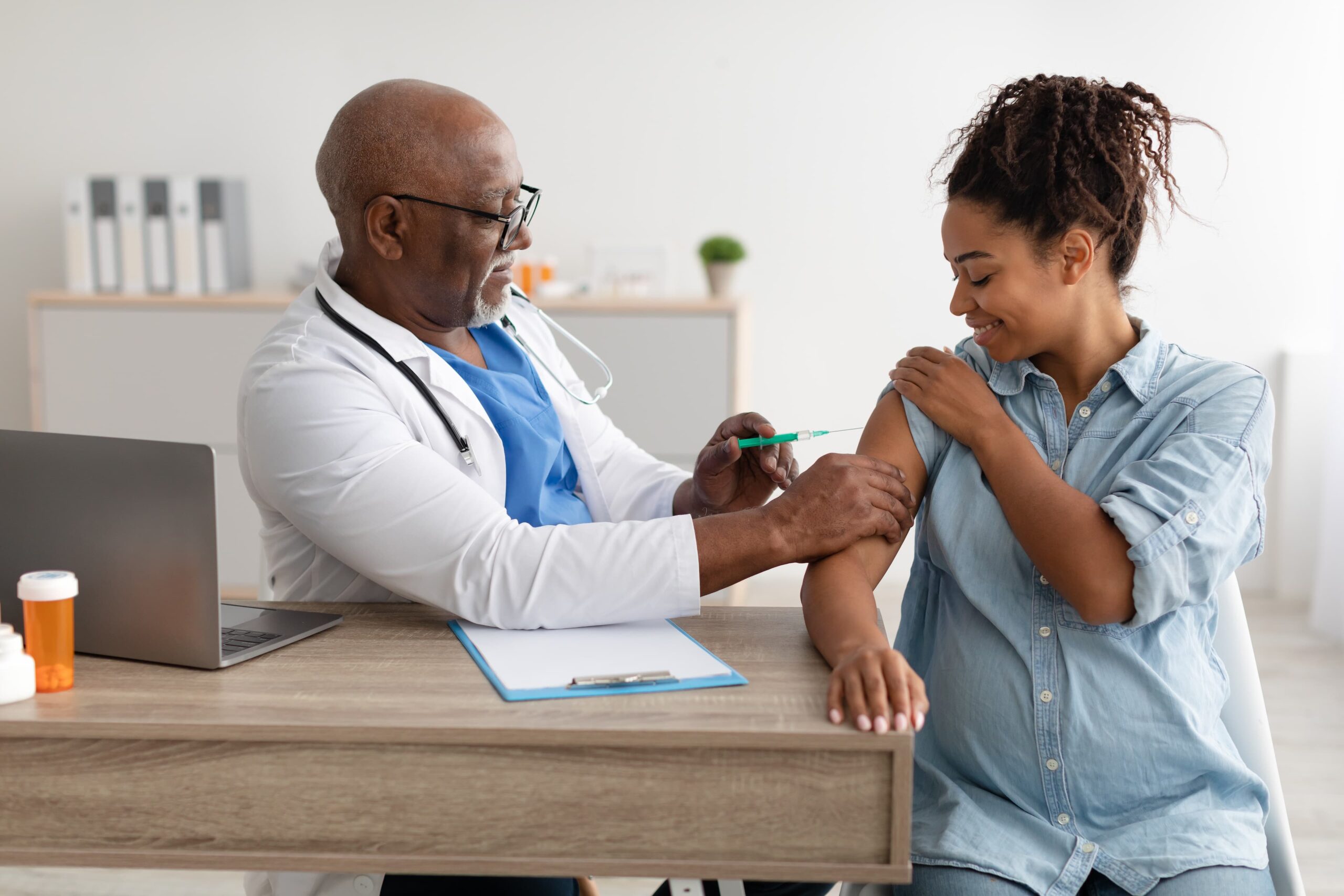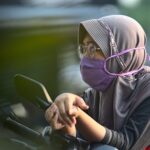As people gather with loved ones or community members, it is important to note that there is a current surge of three highly contagious respiratory viruses—COVID-19, respiratory syncytial virus (RSV), and influenza (flu). These viruses can cause similar symptoms and require specific testing to diagnose. This “tripledemic” is leading to a greater number of people who are ill and is straining many medical and hospital systems. The National Resource Center for Refugees, Immigrants, and Migrants (NRC-RIM) has put together information and resources to help staff and clients stay protected from these illnesses. Each resource described below also features advice on how to best implement these measures in your community.
Stay Home if You are Sick
One of the best ways for staff to protect clients and co-workers, as well as friends and family, is to stay home if they are feeling ill. This includes working remotely, not attending in-person social events, and wearing a well-fitted mask when out in public. If people have had a fever, they should not return to work or socialize until at least 24 hours since their temperature has returned to normal without the use of fever-reducing medications. For COVID-19 specifically, people should check local and workplace COVID-19 isolation requirements. The CDC recommends isolating for at least five days (from day of symptom onset or a positive test in the absence of symptoms) until there are no more symptoms or symptoms begin resolving.
Resources:
- Social Media Squares – Available in 22 languages, these simple facts—including information on staying home when sick—are available in social media format and can be shared with clients and staff alike
- Workplace Poster – “Stay Home from Work” is a flyer that can be printed and posted around the workplace
Wear a Mask
Many medical professionals are encouraging people to wear a mask because of the “tripledemic.” Even if vaccinated, people should consider wearing a mask while in crowded public spaces or public indoor locations. People who are elderly or who have compromised immune systems should consider consistently wearing a mask when indoors with others.
Resources:
- Wearing a Mask – Fact sheet in 39 languages about wearing a mask
- Conversation Guide: Wearing a Mask – Answers to common questions about masking that center immigrant and refugee perspectives
Wash Your Hands
Washing hands frequently and thoroughly helps prevent the spread of germs that cause illness. People should wash their hands with soap and water for at least 20 seconds before touching their eyes, nose, or mouth; after touching their mask; after leaving a public place; and after touching objects or surfaces that may be frequently touched by others. If soap and water are not available, an alcohol-based hand sanitizer containing at least 60% alcohol (see product label) can be used to clean hands.
Resources:
- Wash Your Hands – A printout or poster on how to correctly wash your hands in English, Dari, Pashto, and Urdu.
- Handwashing instructions– Bilingual handouts on how to wash your hands correctly and when and how to use hand sanitizer in Arabic, Traditional Chinese, Simplified Chinese, French, Hindi, Nepali, Russian, Somali, Spanish, and Vietnamese
Get Vaccinated
Safe and effective vaccines for COVID-19 and the flu are readily available at low or no cost. Vaccines help decrease the spread of COVID-19 and the flu, and they help protect people who do get sick from serious illness, hospitalization, and death.
Flu
If people have not yet gotten vaccinated against the flu this season, it is not too late. While the flu typically peaks between December and the end of February, it can have significant activity as late as May. Flu vaccines can be easily gotten through a doctor’s office or at a local pharmacy and are generally free of charge or covered by most insurance plans. The flu vaccination is available for some people as a nasal spray and for others as an injection/shot.
Resources:
- Flu and You – Simple six-page educational handout for clients in Amharic, Arabic, Dzongkha, English, Farsi, S’gaw Karen, Kirundi, Oromo, Somali, and Spanish
- COVID-19 and the Flu – Available in 22 languages
- Fight the Flu – A workplace poster or handout in Arabic, Burmese, English, Hindi, Hmong, S’gaw Karen, Korean, Lao, Oromo, Russian, Somali, Spanish, Thai, and Vietnamese
- Workplace Poster – A “Cover your Cough” flyer that can be printed and posted around the workplace
COVID-19
The CDC recommends that everyone six months of age and older be fully vaccinated against COVID-19 and get a booster once they are eligible. Boosters help restore protection that may have decreased since a previous vaccination. In addition, updated COVID-19 boosters (bivalent) provide additional protection against new variants of the virus.
Resources:
- Conversation Guides – COVID-19 conversation guides are available to help support staff with frequently asked questions related to COVID-19
- Get Vaccinated Campaign – Posters, social media messaging, and other materials in 40 languages encouraging COVID-19 vaccination
- Get the Facts Campaign – Also available in 40 languages, this campaign includes resources about COVID-19 vaccines and boosters, and important information on vaccines for children and people who are pregnant or breastfeeding
RSV
There is no vaccine to prevent RSV, which is the most common source of bronchiolitis (inflammation of the small airways in the lungs) and pneumonia in children under the age of one. RSV is very common, and most people recover within a few weeks; however, it can be serious especially for infants and older adults. Measures you can take to prevent RSV include washing your hands frequently, covering your nose and mouth when sneezing, and avoiding close contact with other people who may be sick.
Resources:
- CDC has a “Prevent RSV” fact sheet available in English, Dari, and Pashto, along with various resources in Spanish at the bottom of this page
Take a COVID-19 Test
COVID-19 self-tests are a quick and easy way to reduce the spread of COVID-19. If a test is positive, people can take the appropriate precautions to avoid infecting others. People should test:
- Immediately if they have COVID-19 symptoms. If symptoms are present but the rapid test is negative, test again for the next few days.
- If they have been exposed to COVID-19
- Immediately before an indoor event or gathering, or as close to the event or gathering time as possible
- Before and after travel
The federal government is making rapid COVID-19 tests available for free again this winter through a limited round of ordering. Households can now order a total of four rapid COVID-19 tests for free.
Go to COVIDTests.gov to order your free tests.
Anyone in the U.S. can order COVID-19 tests at no cost to them. Any person without internet access or who prefers to order by phone will be able to place orders by calling 1-800-232-0233 from 8 a.m. to midnight ET, with interpretation available in 150+ languages. Learn more about the program here.
Medical insurance—including Medicaid or CHIP—also covers up to eight free COVID tests per month. People can access over-the-counter tests through their local pharmacy.
If you or clients prefer to go to a testing center, click here for existing community-based COVID-19 testing sites.
Resources:
- Translations of at-home testing instructions – At-home testing instructions for seven brands in a combined 30 languages in video or written format curated from organizations across the country
- Get the Facts: COVID-19 Testing – A one-page simple handout available in 38 languages
- Conversation Guide: COVID-19 Testing – Answers to common questions about testing that center immigrant and refugee perspectives
Stay safe and healthy in 2023!










